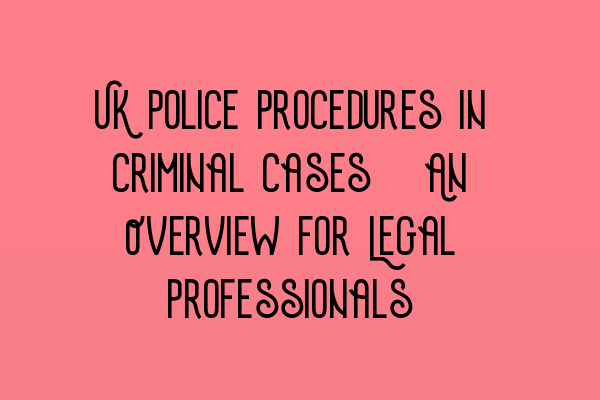UK Police Procedures in Criminal Cases: An Overview for Legal Professionals
Gaining a solid understanding of UK police procedures in criminal cases is essential for legal professionals practicing criminal law. Effective representation of clients relies on a comprehensive knowledge of the various steps and protocols involved.
In this article, we will provide you with an overview of the key police procedures followed in criminal cases within the UK jurisdiction.
1. Arrest
The first step in a criminal case is usually the arrest of a suspect. Police officers have the power to arrest individuals if they have reasonable grounds to believe that an offense has been committed. It is important for legal professionals to know the specific criteria and procedures surrounding arrests, including the requirements for lawful detention and the rights of the accused.
2. Investigation
Once a suspect has been arrested, the police will conduct an investigation to gather evidence and build a case against them. This involves activities such as questioning witnesses, collecting physical evidence, and conducting forensic analysis. Legal professionals should be aware of the investigative techniques employed by law enforcement agencies and how to challenge the validity and admissibility of evidence obtained during this phase.
3. Custody
During the course of an investigation, a suspect may be held in police custody. This usually involves detention in a police station, where the suspect’s rights must be respected, including access to legal representation, the right to silence, and protection against self-incrimination. Legal professionals should be familiar with the regulations governing police custody and the procedures for applying for bail or challenging the lawfulness of detention.
4. Interviews and Interrogation
Interviews and interrogations play a crucial role in extracting information from suspects, witnesses, and victims. The police must adhere to specific protocols during questioning to ensure fairness and accuracy. Legal professionals must be well-versed in the rules governing interviews, including the cautioning process, admissibility of statements, and the rights of the interviewee.
5. Charging and Bail
If the police gather enough evidence to support a case, they may decide to charge the suspect. This involves formally accusing the individual of committing a specific offense. The decision to charge is taken by the Crown Prosecution Service (CPS) based on the evidence provided by the police. Legal professionals need to understand the criteria for charging and the subsequent bail procedures, including the factors considered by the courts when deciding whether to grant bail or remand the accused in custody.
6. Court Proceedings
Once a suspect is charged, the case moves to court proceedings. Legal professionals play a pivotal role in representing their clients during the trial, presenting evidence, cross-examining witnesses, and making legal arguments. It is essential to have a thorough understanding of the rules of evidence, courtroom etiquette, and the procedure for examining and challenging witnesses.
If you are preparing for the SQE 1 Practice Exam Questions or SQE 1 Practice Mocks FLK1 FLK2, or looking for SQE 2 Preparation Courses or SQE 1 Preparation Courses to enhance your knowledge, our law firm offers comprehensive and tailored courses.
Stay updated with the SRA SQE Exam Dates (Solicitors Regulation Authority Solicitors Qualifying Examination) to ensure you are well-prepared for the qualifying exams and succeed in your legal career.
In conclusion, legal professionals must have a solid grasp of UK police procedures in criminal cases to effectively represent their clients. By understanding the arrest, investigation, custody, interviews, charging, and court proceedings, you can navigate the legal landscape with confidence. If you require further guidance or training, our experienced team at SQE Criminal Law & Practice Law UK is here to help.
